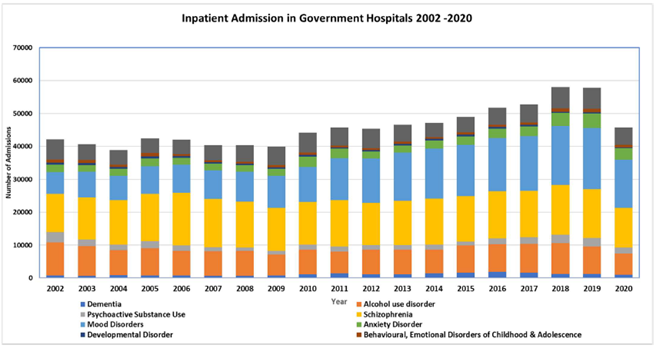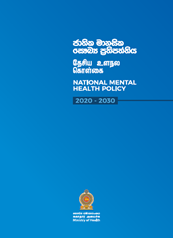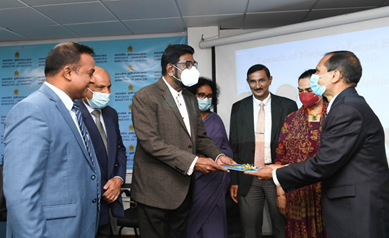Make mental health & well-being for all a global priority
World Mental Health Day is officially commemorated on 10 October every year and aims to raise awareness in the global community about the critical mental health agendas, with a unifying voice through collaboration with various partners, to take action and to create long-term change.
The World Mental Health Day 2022 theme ‘Make Mental Health and Well-Being for All a Global Priority’ is an opportunity for people with mental health conditions, advocates, governments, employers, employees and other stakeholders to come together to recognize progress in this field and to be vocal about what needs to be done to make mental health and well-being a global priority for all. To make this a reality many actions have been undertaken at global and regional levels and one of them is the adoption of the Paro Declaration for Universal Access to People-centered Mental Health Care and Services during the Seventy-fifth Session of the WHO Regional Committee for South-East Asia Region.
As part of this Declaration, Member Countries agreed to develop country-specific targets to achieve universal primary care-oriented mental health services and mainstream mental health in policy planning, implementation, and evaluation. The Paro Declaration also calls for increased funding for community-based mental health networks and continuous supply of medicines and rehabilitation, including occupational therapy for everyone who need them, and strengthening of data gathering and reporting, implementation research and performance monitoring, to ensure context-sensitive improvements of mental health systems.
This declaration comes at a crucial point in time when the COVID-19 pandemic has widened the inequities in availability and access to preventive and curative health services including mental health care services. The Declaration calls for ensuring an effective and comprehensive response to the mental health needs by establishing evidence-based and rights-oriented community mental health networks, and systematically planning for the deinstitutionalization of care for people with severe mental disorders.
It is estimated that around 1 in 8 people live with a mental health condition globally. This number is 1 in 7 for the South-East Asia Region. In Sri Lanka at present there are no nationwide estimations of the prevalence of mental health conditions, epilepsy and other neurological disorders except for the data that are available through hospital inpatient admissions.

Inpatient admissions in government hospitals 2002-2020
Source: Annual Health Bulletin, Ministry of Health
Sri Lanka is heading in the direction of the Declaration with fresh and timely measures including the new National Mental Health Policy 2020-2030 which was developed with the technical support of WHO. The main objectives of the National Mental Health Policy are: 1) To strengthen leadership, legislation, stewardship, research and management functions of the mental health services, 2) To strengthen the delivery of comprehensive, socially and culturally acceptable mental health services and support, in order to reduce the burden of mental disorders and promote mental health, 3) To strengthen human resources, infrastructure and financing for mental health services, and 4) To empower communities in promoting their mental well-being and reducing stigma and discrimination.


Photo: Launching of the National Mental Health Policy 2020-2030
WHO continues to support the Directorate of Mental Health and National Institute of Mental Health to build the capacity of district teams on mental health and decentralize the mental health helpline service (1926) of the National Institute of Mental Health to district level.
In response to the emerging issues at the community level due to socio-economic crisis and the compounding impacts of the pandemic, MOH together with Civil Society Organizations and WHO technical assistance, implements a Community-Based Mental Health and Psychosocial Support (MHPSS) programme named ‘Manohari’. The programme is a non-expert driven intervention that is designed to build community capacity to cope and build resilience through the use of culturally-sensitive techniques such as storytelling. Manohari provides a platform and a safe space for community members to share the challenges they face and discuss collective actions towards improving communal wellbeing. Currently, the Directorate of Mental Health is conducting the Manohari training with the support of WHO for the health staff in nine districts.
WHO Sri Lanka will collaborate with Ministry of Health to adopt and develop guidelines and a package on mental health for workplaces in line with the Mental health at work: policy brief, and WHO guidelines on mental health at work. The Mental health at work: policy brief provides actions for governments, employers, employers’ and workers’ organizations, civil society and health service planners to prevent work-related mental health conditions, protect and promote mental health at work and support workers with mental health conditions. WHO guidelines on mental health at work provide evidence-based recommendations to promote mental health, prevent mental health conditions, and enable people living with mental health conditions to participate and thrive in work.
The Ministry of Health with the support of WHO is developing the user and carer guidelines to ensure the safety and dignity of mental health services users and carers and achieve a person-centered approach to mental health care. Guidelines provide advices for consumers and carers to exercise choice, control, and influence the decisions that affect their lives. Community empowerment and active engagement of people with lived experience helps reduce stigma and discrimination against people with mental disorders, family members and caregivers.
Key related resources
World Mental Health Day: https://www.who.int/campaigns/world-mental-health-day/2022
Paro Declaration committing to Universal Access to People-centered Mental Health Care and Services:
Guideline on mental health at workplace: https://www.who.int/publications/i/item/9789240053052
Mental health at work: policy brief: https://www.who.int/publications/i/item/9789240057944
WHO will continue to support the country’s efforts to reorient primary health care system that led to efficient and equitable health system to better meet mental health and psychosocial needs of people in Sri Lanka.
